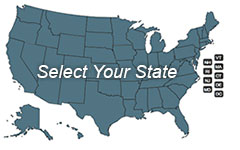Mental Health Counselor Licensure in Connecticut

Connecticut mental health counselors hold state licensing as Licensed Professional Counselors, or LPCs. The LPC can be earned by professionals with varying counseling specialties. However, requirements for program length are on a par with national mental health counseling certification standards.
- Featured Online CACREP Accredited Master's in Counseling Program Options:
- Liberty University, a non-profit university, offers a CACREP accredited online Master of Arts in Clinical Mental Health Counseling. Click here to learn more about Liberty University and their Master of Arts in Clinical Mental Health Counseling.
- Prepare for counseling licensure in as few as 27 months with Pepperdine’s online MA in Clinical Psychology - no GRE required. The program is top ranked for return on investment (ROI) by OnlineU.
- Southern New Hampshire University (SNHU) offers a CACREP accredited online BA in Psychology - Mental Health. Click here to learn about the counseling programs at SNHU.
- Grand Canyon University offers an M.S. in Clinical Mental Health Counseling with an Emphasis in Childhood and Adolescence Disorders; Christian Counseling; Marriage & Family Therapy and Trauma.
- Sacred Heart University's Master of Arts in Clinical Mental Health Counseling is offered online and was developed based off CACREP standards to prepare graduates for licensure in most states. Click here to learn more about Sacred Heart University and the online Master of Arts in Clinical Mental Health Counseling.
Select a Connecticut Licensed Professional Counselor Licensure Topic:
- Licensed Professional Counselor Education Requirements
- Required Examination
- Supervision Requirements
- Application Process
- Out-of-State Counselors
- Adjunct Mental Health Counseling Certification
- Contacts and Additional Information
LPC Educational Requirements
The LPC candidate must earn a degree in counseling or a related field. Psychology, marriage and family therapy, and social work are among the potentially qualifying graduate degree programs.
The program must represent 60 semester hours of coursework. It must include coursework in the following core counseling areas:
- Professional orientation to counseling
- Cultural and social foundations
- Human growth and development
- Helping relationships or counseling theories and techniques
- Group dynamics, processing, and counseling
- Career and lifestyle development
- Appraisal or tests and measurement
- Research and evaluation
The educational certification form includes a description of course content under each category.
Coursework must be taken through a regionally accredited institution such as the New England Association of Schools and Colleges Commission on Institutions of Higher Education. The Connecticut Department of Health has provided a link to Council for Higher Education Accreditation (CHEA) accrediting agencies (https://www.chea.org/directories).
Supervised Experience
A candidate for licensure will need 3,000 hours of supervised experience. Qualifying experience is post-graduate and takes place over a period of at least one year. * Over the course of the supervisory period, the supervisee must have at least 100 hours of clinical supervision.
Supervision may be provided by a Licensed Professional Counselor or by a professional with any of the following credentials:
- Licensed Marital and Family Therapist
- Licensed Clinical Social Worker
- Licensed Psychologist
- Clinical Specialist in Adult Psychiatric and Mental Health Nursing
- Licensed Physician certified in psychiatry by the American Board of Psychiatry and Neurology
*Candidates should be aware that many credentialing agencies require that the experience take place over a longer period of time.
Examination Requirements
Connecticut will accept either of two examinations offered by the National Board for Certified Counselors: the National Counselor Examination (NCE) or the National Mental Health Counseling Examination (NCMHCE). The NCE is a generalist counselor examination; the NCMHCE, a mental health specialist examination. However, states that use the “mental health counselor” designation may require either examination or both.
Candidates who have not yet taken a qualifying examination will submit signed registration forms directly to the NBCC, accompanied by official sealed transcripts and the requisite fee.
The NBCC will continue to administer the NCE and NCMHCE examinations in pencil and paper format in Hartford at a fee of $145 through mid-January 2015. At that point, all examinations will move to a computer-delivered format. Candidates can visit the ‘Connecticut’ page of the NBCC website for updated information (http://www.nbcc.org/directory/CT).
In most states, the examination is offered at Applied Measurement Professionals (AMP) testing sites during monthly testing windows (http://www.nbcc.org/directory).
The National Board for Certified Counselors can be reached by telephone at 336-217-4111 or by email at exam at cce-global.org.
Study resources for the NCE and NCMHCE examinations are available on the NBCC website (http://www.nbcc.org/Exam/StudyGuides).
The Application Process
Application materials are available on the DPH website (http://www.ct.gov/dph/cwp/view.asp?a=3121&q=396906). The application requires notarization. It must be accompanied by a $315 fee. Supporting documentation is to come from primary sources.
The educational institution will fill out a certification form verifying coursework and total semester hours.
The graduate will also need official transcripts for all graduate coursework.
The supervising professional will submit a verification form.
Verification of examination results is to come directly from the NBCC.
An applicant who has legal or disciplinary history will need to provide additional supporting documentation, for example, certified court documents or settlement information.
Applications are to be sent to DPH Professional Counselor Licensure in Hartford. DPH will accept hand delivered documents, but does not recommend this method.
Connecticut applicants should not expect notification of missing documentation. They should communicate with the licensing agency via email to stay apprised of application status.
Out-of-State Counselors
Counselors must provide license verification from all states where they have held counseling licensure, registration, or certification. The counselor will fill out the top portion of the verification form and send it to the current state of licensure, along with any fee that may be required by the receiving agency.
Adjunct Mental Health Counseling Certification
The NBCC’s Certified Clinical Mental Health Counselor (CCMHC) credential does not substitute for state licensure but does provide additional validation of a counselor’s expertise in mental health counseling. There are some additional coursework requirements (http://www.nbcc.org/Certification/CertifiedClinicalMentalHealthCounselor). Counselors who seek the credential will take two examinations and earn a National Certified Counselor (NCC) credential en route to the CCMHC.
Additional Information
LPC licensing information can be accessed on the site of the Connecticut Department of Health (http://www.ct.gov/dph/cwp/view.asp?a=3121&q=396906). The Professional Counselor Licensure unit can be reached by telephone at 860-509-7603 or by email at dph.counselorsteam at ct.gov.
The Connecticut Mental Health Counselors Association (https://www.ccacounseling.com/#!event-list) is an additional professional resource. CMHCA does not issue licenses, but does have a database of professionals who may serve as clinical supervisors.
Find Mental Health Counselor Licensure Requirements in Your State:

Learn about becoming a Mental Health Counselor in your state:
To View Full U.S. Map Click Here.